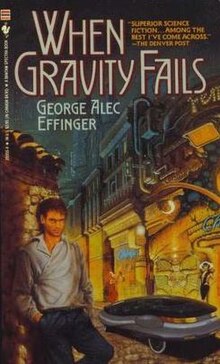
Cyberpunk is a subgenre of science fiction in a dystopian futuristic setting that tends to focus on a "combination of lowlife and high tech", featuring futuristic technological and scientific achievements, such as artificial intelligence and cybernetics, juxtaposed with societal collapse, dystopia or decay. Much of cyberpunk is rooted in the New Wave science fiction movement of the 1960s and 1970s, when writers like Philip K. Dick, Michael Moorcock, Roger Zelazny, John Brunner, J. G. Ballard, Philip José Farmer and Harlan Ellison examined the impact of drug culture, technology, and the sexual revolution while avoiding the utopian tendencies of earlier science fiction.
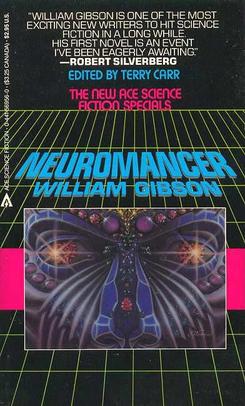
Neuromancer is a 1984 science fiction novel by American-Canadian writer William Gibson. Considered one of the earliest and best-known works in the cyberpunk genre, it is the only novel to win the Nebula Award, the Philip K. Dick Award, and the Hugo Award. It was Gibson's debut novel and the beginning of the Sprawl trilogy. Set in the future, the novel follows Henry Case, a washed-up hacker hired for one last job, which brings him in contact with a powerful artificial intelligence.
George Alec Effinger was an American science fiction author, born in Cleveland, Ohio.
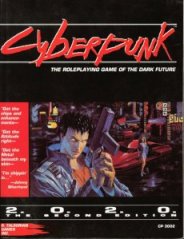
Cyberpunk is a tabletop role-playing game in the dystopian science fiction genre, written by Mike Pondsmith and first published by R. Talsorian Games in 1988. It is typically referred to by its second or fourth edition names, Cyberpunk 2020 and Cyberpunk Red, in order to distinguish it from the cyberpunk genre after which it is named.
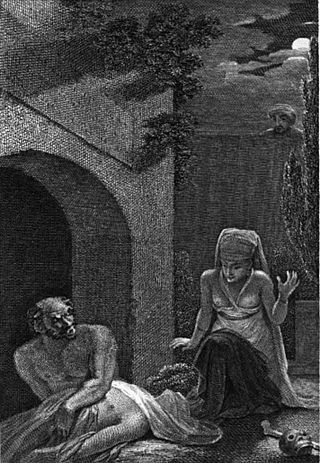
A ghoul is a demon-like being or monstrous humanoid. The concept originated in pre-Islamic Arabian religion, associated with graveyards and the consumption of human flesh. Modern fiction often uses the term to label a certain kind of monster.

Mona Lisa Overdrive is a science fiction novel by American-Canadian writer William Gibson, published in 1988. It is the final novel of the cyberpunk Sprawl trilogy, following Neuromancer and Count Zero, taking place eight years after the events of the latter. The novel was nominated for the Nebula Award for Best Novel, the Hugo Award for Best Novel, and the Locus Award for Best Science Fiction Novel in 1989.

Altered Carbon is a 2002 cyberpunk novel by the English writer Richard K. Morgan. Set in a future in which interstellar travel and relative immortality is facilitated by transferring consciousnesses between bodies ("sleeves"), it follows the attempt of Takeshi Kovacs, a former U.N. elite soldier turned private investigator, to investigate a rich man's death. It is followed by the sequels Broken Angels and Woken Furies.
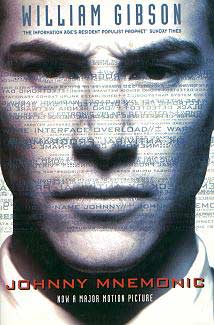
"Johnny Mnemonic" is a science fiction short story by American-Canadian writer William Gibson. It first appeared in Omni magazine in May 1981, and was subsequently included in Burning Chrome, a 1986 collection of Gibson's short fiction. It takes place in the world of Gibson's cyberpunk novels, predating them by some years, and introduces the character Molly Millions, who plays a prominent role in the Sprawl trilogy of novels.

Hell: A Cyberpunk Thriller is a point-and-click adventure game released in 1994, developed by Take-Two Interactive Software and published by GameTek for the DOS. It was ported to 3DO, Macintosh and Microsoft Windows. The game was notable for being one of the first CD-ROM-only games to use speech with hi-res graphics, and was designed by the same team as BloodNet, the story of which is referenced to during one of Hell's subplots. Dennis Hopper, Grace Jones, Stephanie Seymour, and Geoffrey Holder are among the actors in the game. Seymour and Holder appear in live action footage, while the rest of the cast, including Hopper and Jones, lend their voices to computer animated representations.
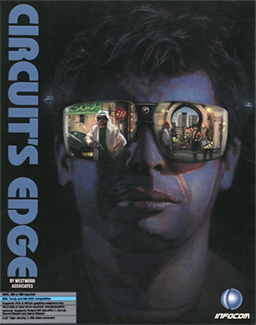
Circuit's Edge is a video game developed by Westwood Associates and released by Infocom in 1990. It is based on George Alec Effinger's 1987 novel When Gravity Fails. The game is a hybrid interactive fiction/role-playing video game; it contains a window of text, a graphic window for depiction of the player's current location, and various menus and mini-windows for character statistics and other game functions.
Marid is a type of powerful devil in Islamic traditions. The Arabic word meaning rebellious is applied to such supernatural beings.

Many of the tropes of science fiction can be viewed as similar to the goals of transhumanism. Science fiction literature contains many positive depictions of technologically enhanced human life, occasionally set in utopian societies. However, science fiction's depictions of technologically enhanced humans or other posthuman beings frequently come with a cautionary twist. The more pessimistic scenarios include many dystopian tales of human bioengineering gone wrong.

Hardwired is a 1986 cyberpunk science fiction novel by American writer Walter Jon Williams.
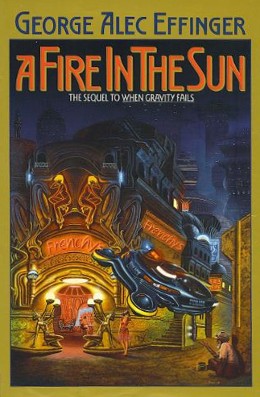
A Fire in the Sun is a cyberpunk science fiction novel by American writer George Alec Effinger, published in 1989. It is the second novel in the three-book Marîd Audran series, following the events of When Gravity Fails, and concentrating on Marîd's experience as he becomes the main lieutenant of Friedlander Bey's business empire while realizing that his new master has darker aspects than he suspected.
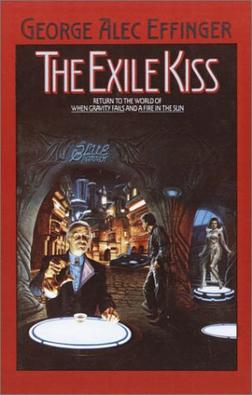
The Exile Kiss is a cyberpunk science fiction novel by American writer George Alec Effinger, published in 1991. It is the third novel in the three-book Marîd Audran series, following the events of A Fire in the Sun. The title of the novel comes from Coriolanus, by William Shakespeare: "O! a kiss / Long as my exile, sweet as my revenge!".

Cyberpunk the CCG is an out-of-print collectible card game designed by Peter J. Wacks, based on R. Talsorian Games' dystopian near-future role-playing game Cyberpunk 2020.
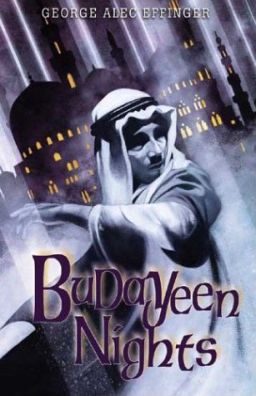
Budayeen Nights is a collection of cyberpunk science fiction short stories and novelettes by George Alec Effinger, published in 2003. The work consists of nine individual stories by Effinger, with a foreword and story introductions by Barbara Hambly. Seven of the nine stories had been published previously in other forms, such as magazines, while one consists of the first two chapters of Word of Night, which was to be the fourth book in the Marîd Audran series, following The Exile Kiss.
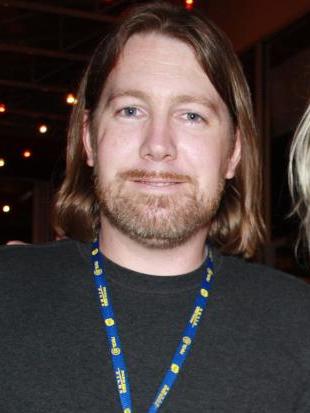
Christopher Robert Cargill is an American screenwriter, novelist, podcast host, and former film critic known under the pseudonyms Massawyrm and Carlyle. Cargill currently resides in Austin, Texas with his wife. He is best known for writing the films Sinister (2012), Sinister 2 (2015), Doctor Strange (2016), and The Black Phone (2021). He is a frequent writing collaborator of Scott Derrickson.

